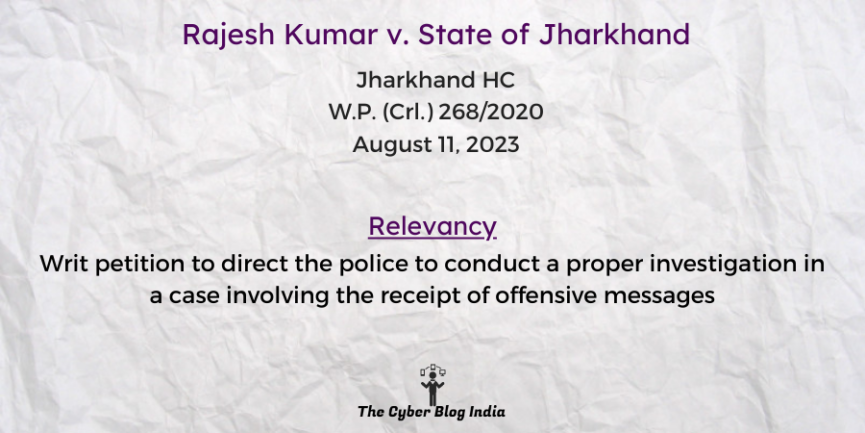Rajesh Kumar v. State of Jharkhand

Rajesh Kumar v. State of Jharkhand
In the High Court of Jharkhand
W.P. (Crl.) 268/2020
Before Justice Sanjay Kumar Dwivedi
Decided on August 11, 2023
Relevancy of the case: Writ petition to direct the police to conduct a proper investigation in a case involving the receipt of offensive messages
Statutes and Provisions Involved
- The Information Technology Act, 2000 (Section 66)
- The Indian Penal Code, 1860 (Section 504)
- The Code of Criminal Procedure, 1973 (Section 173, 216, 319)
Relevant Facts of the Case
- The investigation involves a case in which the petitioner allegedly transmitted an offensive electronic text that provoked the breaking of public peace.
- The respondents filed a counter-affidavit revealing that a final form against both the accused had been submitted under Section 504 of the Indian Penal Code, 1860, as a reciprocal to the writ petition.
- The petitioners had filed a writ petition seeking directions for the state to complete the investigation.
Prominent Arguments by the Advocates
- The petitioner’s counsel argued that the mobile numbers mentioned in the FIR sent offensive content to the petitioner. Moreover, the police did not investigate those numbers. They have submitted the final form prematurely.
- The respondent’s counsel submitted that the petitioner had casual conversations with those numbers, including texts such as “Hi” and “Good morning.” The offensive content, in handwritten form, was present in this conversation. Two individuals associated with the phone numbers were out-of-state residents. The police only submitted the final form after the investigation.
Opinion of the Bench
- Fair investigation is also a part of constitutional rights under Articles 20 and 21.
- Investigations are to be carried out unbiasedly, transparently, and judiciously. If courts find that this is not being followed, they must deal with it with an iron hand.
- This was not a case where the court would invoke its powers under Section 173(8) of the Code of Criminal Procedure, 1973.
- The court can alter the charge under Section 216 when the matter is pending. Additionally, the court can call any person under Section 319 if any new details arise during the trial.
Final Decision
- The bench disposed of the writ petition.
